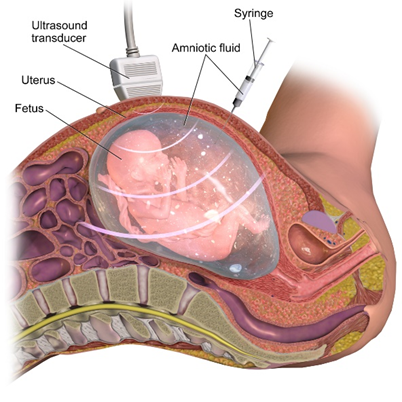A client at 20 weeks gestation reports discomfort after amniocentesis procedure to the nurse. Which of the following assessment findings warrants priority action by the nurse?
Braxton Hicks contraction
Amniotic fluid contains fetal urine
Prolonged vaginal bleeding
Lab results reveal abnormal chromosome cells
The Correct Answer is C
Explanation:
A. Braxton Hicks contraction
Braxton Hicks contractions are often referred to as "practice" contractions and are common during pregnancy. They are typically irregular and do not cause cervical changes. While discomfort after an amniocentesis procedure can sometimes trigger Braxton Hicks contractions, they are not usually a cause for immediate concern unless they become frequent, intense, or are accompanied by other signs of preterm labor, such as regular contractions, lower back pain, pelvic pressure, or changes in vaginal discharge.
B. Amniotic fluid contains fetal urine
The presence of fetal urine in the amniotic fluid is a normal and expected process during pregnancy. Fetal urine production contributes to the volume and composition of amniotic fluid, helping maintain the environment in the uterus and supporting fetal development. This finding is not directly related to the client's discomfort after an amniocentesis procedure and is not a cause for immediate concern unless there are other complications or abnormalities related to the amniotic fluid composition.
C. Prolonged vaginal bleeding
Prolonged vaginal bleeding after an amniocentesis procedure is a significant finding that requires immediate attention. While some spotting or mild bleeding can occur after the procedure, prolonged or significant bleeding may indicate complications such as uterine injury, placental abruption, or other issues that need urgent assessment and intervention by healthcare providers.

D. Lab results reveal abnormal chromosome cells
Abnormal chromosome cells found in the amniotic fluid sample obtained during amniocentesis may indicate genetic abnormalities or conditions in the fetus. While this finding is significant and requires follow-up and further evaluation, it is not an immediate concern in terms of the client's discomfort or the need for priority action by the nurse unless it is associated with other urgent clinical signs or symptoms.
Nursing Test Bank
Naxlex Comprehensive Predictor Exams
Related Questions
Correct Answer is B
Explanation
Explanation:
To calculate the estimated date of delivery (EDD) based on the client's last menstrual period (LMP), the nurse can use Naegele's rule. Naegele's rule calculates the EDD by adding 7 days to the first day of the LMP, subtracting 3 months, and then adding 1 year.
Given the client's last menstrual period was July 4, 2020, we can apply Naegele's rule:
Add 7 days to July 4, 2020: July 11, 2020
Subtract 3 months: April 11, 2020
Add 1 year: April 11, 2021
Therefore, the appropriate response by the nurse is:
B. April 11, 2021
Correct Answer is D
Explanation
Explanation:
A. Expecting fathers to participate in the labor experience:
In many cultures, the involvement of fathers in the labor and childbirth experience is encouraged and valued as it promotes family bonding and support. However, cultural sensitivity requires recognizing that family dynamics and expectations can vary widely across cultures. Some cultures may prioritize the presence of female family members or may have specific rituals or traditions related to childbirth that may or may not involve fathers. Being culturally sensitive in this context means respecting and accommodating the preferences and traditions of each family rather than assuming a one-size-fits-all approach.
B. Using hand signs to communicate:
Using hand signs or gestures can be an effective communication strategy, especially when there are language barriers. It can help bridge communication gaps and enhance understanding between healthcare providers and clients from diverse cultural backgrounds. However, cultural sensitivity also involves recognizing that communication goes beyond language and includes understanding cultural norms, beliefs, and non-verbal cues that may vary across cultures. Therefore, while using hand signs can be helpful, it should be complemented by a broader understanding of cultural communication styles.
C. Including the use of MyPlate in nutrition teaching:
MyPlate is a visual tool used in nutrition education to promote healthy eating habits by illustrating recommended food portions from various food groups. While using MyPlate can be a valuable resource in nutrition teaching, cultural sensitivity in nutrition education requires consideration of cultural dietary practices, preferences, taboos, and traditional foods specific to each client's cultural background. It's important to tailor nutrition education to align with cultural norms and values related to food and eating habits to promote culturally appropriate and effective health education.
D. Assessing health beliefs and practices before health teaching:
This option reflects a crucial aspect of cultural sensitivity in healthcare. Assessing a client's health beliefs, values, practices, and cultural background before initiating health teaching allows healthcare providers to tailor their approach to meet the unique needs, preferences, and cultural context of each client. Understanding cultural perspectives on health and wellness enables providers to deliver more effective and culturally appropriate care, promote better communication, build trust, and enhance health outcomes.
Whether you are a student looking to ace your exams or a practicing nurse seeking to enhance your expertise , our nursing education contents will empower you with the confidence and competence to make a difference in the lives of patients and become a respected leader in the healthcare field.
Visit Naxlex, invest in your future and unlock endless possibilities with our unparalleled nursing education contents today
Report Wrong Answer on the Current Question
Do you disagree with the answer? If yes, what is your expected answer? Explain.
Kindly be descriptive with the issue you are facing.
